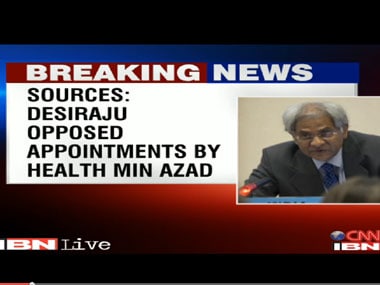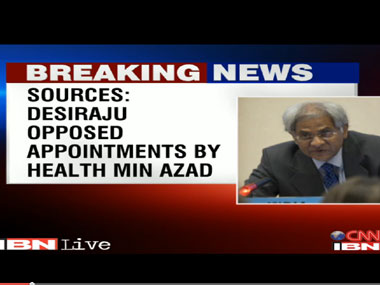A column on civil servants and their plight in Free India does not exactly make stimulating copy either for the editor or his readers. The subject has actually become hackneyed with so much written about Durga Shakti Nagpal, Ashok Khemkha, et al. Still, it would be grievous indifference on the part of public spirited men not to take cognizance of any unsavoury episode in which a distinguished senior government officer has been treated shabbily, and particularly when there is a brazen refusal to admit injustice even after reflection by those who had perpetrated it either deliberately or by mistake. I don’t know Desiraju, the most recent civil service victim of Ministerial caprice. By all accounts he is an IAS officer of great integrity, who does not flaunt his enviable lineage as a former President’s grandson. I am told he has an excellent track record of service in the IAS. More than this, his performance in the Union Health Ministry from where he was unceremoniously eased out a few days ago is lauded for its innovation and sensitivity to the cause of public health. The decision of his Minister to get rid of him when he had done less than the Apex Court-mandated two-year tenure for such posts has raised the hackles among those who know about the quality of his leadership and his utter dedication to a much neglected sector of public administration. His ouster is credibly linked to his unbending opposition to the return to the Indian Medical Council (IMC) of a corrupt member of the medical fraternity who had been notorious and unabashed in his ways of conducting public business. This worthy, a colourful and bellicose personality, is alleged to have committed many irregularities which had been investigated by the CBI. He is said to have made up for his lack of integrity by developing powerful contacts who are placed in vital positions in the hierarchy. It is sad but true that the Prime Minister, who is not only the head of government but the Minister for Department of Personnel which is the Cadre Authority for the IAS , has been unaffected by the event. There is no information that either the Cabinet Secretary, the highest civil servant in the country, who is supposed to look after the interests of the whole civil service, has exerted himself to protect a grievously wronged civil servant. No wonder that the IAS and IPS - about which I know more than of the other services- are so demoralised and feel intimidated. This is no doubt a familiar story in the corridors of Indian administration. There are many Desirajus who have possibly gone unsung and unwept. The rot in the administration of the civil service in the country set in around the mid-1970s. Generally speaking, until then, unholy external influence wad allowed only a limited opportunity to influence the course of public administration. We came across a rank dishonest civil servant in those times only once in a while. Although government salaries were modest, a majority of public servants remained above temptation, and the politician kept his distance from the State Secretariat and Police Headquarters. Legendary was the tough handling of meddling party men by both Rajaji and Kamaraj Nadar, distinguished Chief Ministers of the then Madras State, who made it very clear that there was no place in their rule for overbearing Ministers or legislators trying to browbeat the honest civil servant. It was Kamaraj who admonished one of his Ministers for summoning the Chief Secretary to his room. He suggested that it was the former who should have gone to the Chief Secretary’s office if there was some business to transact. Now the Chief Secretary and the DGP will have to genuflect even before the first-term MLA! [caption id=“attachment_1386869” align=“alignleft” width=“380”]
 Representational image. Ibnlive[/caption] The rot set in in late 1960s, and thereafter the decline was steep. The honest and fearless servant who took decisions on merit was started to be despised. I still remember how around that time, as a young Assistant Superintendent of Police who had put in less than a year as independent charge of a sub-division, I was shunted out all because my team caught a ruling party bigwig literally without pants in a red light area during a midnight raid, and I refused to bury it without allowing the law to take its own course. The man was arrested, chargesheeted and fined under the then Immoral Traffic (Suppression) Act. A delegation from the ruling party was quick to go to the State capital and protest. They got me transferred to a godforsaken place which had never even once set eyes on an IPS officer. I was undaunted and was about to pack up my bags to report to the new place. But then a few enlightened citizens who had seen me at work thought this was outrageous and petitioned for my retention in the station where I had done enough to win the confidence of right thinking people. Since I had not been privy to this effort to undo the injustice meted out to me, I was pleasantly surprised to receive soon after the orders cancelling my transfer. In contrast, nearly twenty years later when I was peremptorily eased out of the sensitive job of IG Intelligence twice by the same party within an interval of a few years, no one came to my rescue. Such treatment was now looked upon as routine, one which did not involve the self-respect of a senior civil servant, and there was a popular acceptance of the might of the political executive whom nobody dared to challenge. I wonder whether enlightened public pressure can any longer salvage dedicated civil servants who valued integrity more than the pomp and pelf that went with a career in the All India Services. We have now reached the nadir in the standards of public administration, a reversal of which seems hugely impossible. The tragedy is, like in the case of corruption, maltreatment of the civil service cuts across party lines. It is true that many civil servants themselves have brought about this sorry state of affairs, purely out of a desire for favoured treatment and for bagging the so- called ‘plum postings’. They are guilty of crawling when they were expected only to bend, as so colourfully put down by the Shah Commission that went into the excesses during the 1975-76 National Emergency imposed by New Delhi. Even at the risk of sounding cynical I foresee no improvement to this deplorable state of affairs. We need strong Cabinet Secretaries, Chief Secretaries and Directors-General of Police who are appointed on the basis of a track record for effectiveness and integrity and who will stand up for the honest civil servant, and at the same time not hesitate to punish the dishonest one, even if the latter is a favourite of the political executive. I am not for a moment suggesting that current appointees are not men and women of worth and rectitude. My only grievance is that many of them have inexplicably yielded ground to rapacious and insolent politicians. This has to change, and change quickly before the entire civil service in the country collapses. I am definitely not asking for the moon. This change is eminently possible with the assiduous building of a corps of civil servants who had been indoctrinated in the essentials of courage and ethics. For this to happen public opinion will have to exert itself. (The writer is a former CBI Director.)
Representational image. Ibnlive[/caption] The rot set in in late 1960s, and thereafter the decline was steep. The honest and fearless servant who took decisions on merit was started to be despised. I still remember how around that time, as a young Assistant Superintendent of Police who had put in less than a year as independent charge of a sub-division, I was shunted out all because my team caught a ruling party bigwig literally without pants in a red light area during a midnight raid, and I refused to bury it without allowing the law to take its own course. The man was arrested, chargesheeted and fined under the then Immoral Traffic (Suppression) Act. A delegation from the ruling party was quick to go to the State capital and protest. They got me transferred to a godforsaken place which had never even once set eyes on an IPS officer. I was undaunted and was about to pack up my bags to report to the new place. But then a few enlightened citizens who had seen me at work thought this was outrageous and petitioned for my retention in the station where I had done enough to win the confidence of right thinking people. Since I had not been privy to this effort to undo the injustice meted out to me, I was pleasantly surprised to receive soon after the orders cancelling my transfer. In contrast, nearly twenty years later when I was peremptorily eased out of the sensitive job of IG Intelligence twice by the same party within an interval of a few years, no one came to my rescue. Such treatment was now looked upon as routine, one which did not involve the self-respect of a senior civil servant, and there was a popular acceptance of the might of the political executive whom nobody dared to challenge. I wonder whether enlightened public pressure can any longer salvage dedicated civil servants who valued integrity more than the pomp and pelf that went with a career in the All India Services. We have now reached the nadir in the standards of public administration, a reversal of which seems hugely impossible. The tragedy is, like in the case of corruption, maltreatment of the civil service cuts across party lines. It is true that many civil servants themselves have brought about this sorry state of affairs, purely out of a desire for favoured treatment and for bagging the so- called ‘plum postings’. They are guilty of crawling when they were expected only to bend, as so colourfully put down by the Shah Commission that went into the excesses during the 1975-76 National Emergency imposed by New Delhi. Even at the risk of sounding cynical I foresee no improvement to this deplorable state of affairs. We need strong Cabinet Secretaries, Chief Secretaries and Directors-General of Police who are appointed on the basis of a track record for effectiveness and integrity and who will stand up for the honest civil servant, and at the same time not hesitate to punish the dishonest one, even if the latter is a favourite of the political executive. I am not for a moment suggesting that current appointees are not men and women of worth and rectitude. My only grievance is that many of them have inexplicably yielded ground to rapacious and insolent politicians. This has to change, and change quickly before the entire civil service in the country collapses. I am definitely not asking for the moon. This change is eminently possible with the assiduous building of a corps of civil servants who had been indoctrinated in the essentials of courage and ethics. For this to happen public opinion will have to exert itself. (The writer is a former CBI Director.)
RK Raghavan is a former director of Central Bureau of Investigation and a former joint director of the Intelligence Bureau, New Delhi
)